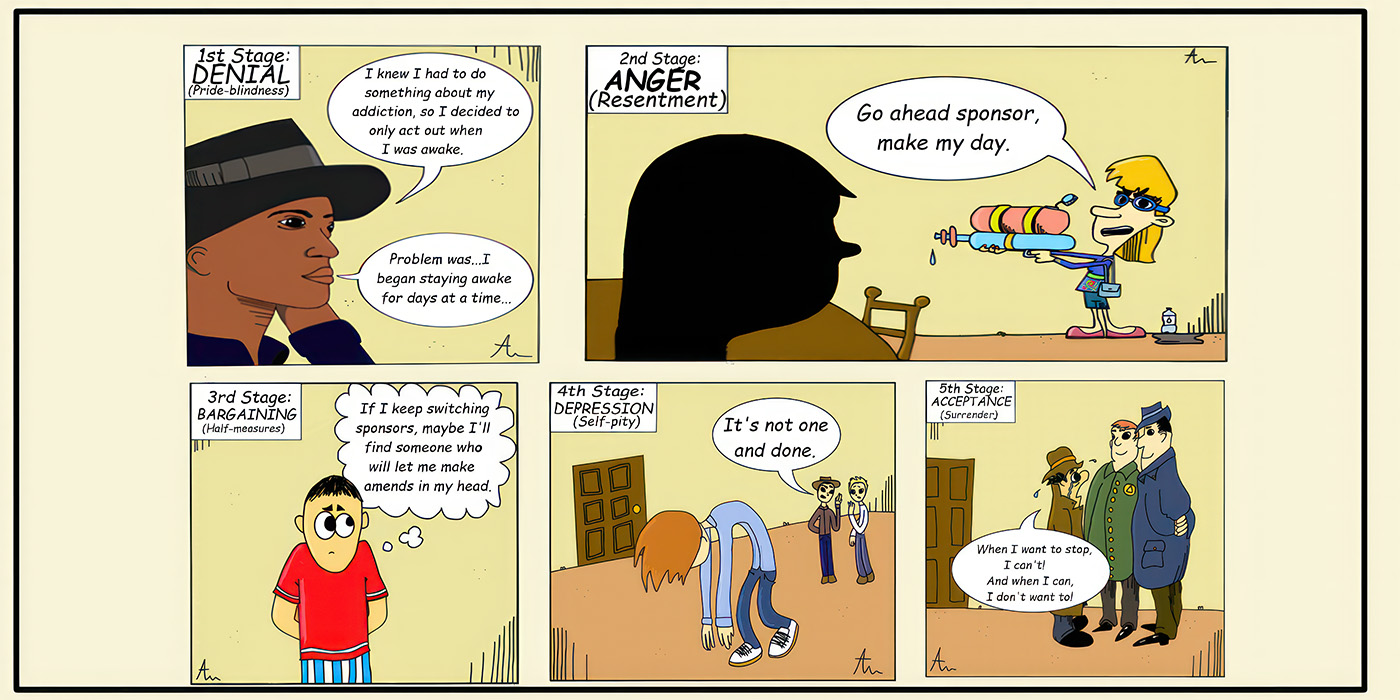For over twenty-seven years Ray S., aka “Tucson Ray,” was the genuine, formative force for SA prison ministry (SACFC). He wrote the sponsor-by-mail approach that is still in use, and started the prison meetings. He created the protocol for how to approach prison officials. Ray S. died June 17, 2018 at age 87. We are forever indebted to him for blazing the trail in SA service. You can read his full story on p. 15 of the October 2019 Essay edition. In this article Ray shared some of the main lessons he learned in his recovery.
My story is very similar to many I have read and heard in SA. I was sexually obsessive and compulsive for over 50 years. My disease got worse and worse until I finally found myself living in a flop house hotel, losing my job, frequenting the porno shops and flics, and having lost my family and friends. In desperation, I called SA and got help. From the time I attended that first meeting, I have been sober, and my recovery has progressed many times faster than my disease had. In gratitude, I share now the seven most important gems I have discovered in SA.
1. Sobriety made self-esteem possible
Before I came to SA, I was constantly overwhelmed by guilt and shame. My behavior was contrary to my own moral code and in violation of society’s expectations. As a result, my self-esteem was at rock bottom. I had been suicidal on five different occasions. I had been working with a very competent hypno-therapist on the self-esteem issue, but to no avail.
However, at about thirty days of sobriety, the therapy began to work. In fact, I soon discontinued the therapy, and my self-esteem has grown by leaps and bounds as l started living the Steps. Today, I recognize that I am a child of God, and that as such, I share in His divine nature as fully as in the human nature of my earthly parents. I take great joy in the progress of my recovery since I decided to let God direct my life.
2. Participation in the Fellowship relieved fear
Before coming into the fellowship, I lived a dual life, one very public and the other very secret. My family and friends had no idea of my obsession and compulsion. I was afraid that they would somehow find out and have nothing more to do with me.
But when I came into SA, I learned that I needed to share my deepest, darkest secrets if I wanted to recover. And sharing I did—all of my Steps, even a summary of my Fourth, with my home group. As disclosure brought relief from my obsession, I gradually developed a genuine enthusiasm for sharing my insides with my fellows.
3. Working the Steps relieved guilt and shame
I carried an enormous load of guilt and shame into SA. I knew that my behavior was very wrong, but I also knew that I couldn’t stop for a whole day. I was convinced that my problem was moral depravity, and that I was beyond hope. But in SA, I have learned that God could and would help me, if only I worked the Steps. As I worked seriously on my shortcomings and began to make amends, I felt the guilt and shame slide away. My awful past became simple historical fact.
4. Recovery nurtured peace and joy
I had always felt on edge and unhappy. I was a bundle of “self-will run riot.” Anger and resentment filled my days and nights. There was no peace in me, and certainly no joy. But in recovery I began to learn how to live. I began to feel good about myself and my life. I found significant serenity, and I developed the ability to enjoy life in freedom from obsession and compulsion.
5. Life without sex is better than life with compulsive sex
My life had been marked by a compulsive quest for better and better sex, which was never good enough to satisfy my cravings. Every waking moment focused on my obsession, and my compulsion drove most of my activities. My wife had left me and left town. I had no friends or relatives in town.
For the first year of my sobriety my only friends were my fellows in SA. For me, sobriety meant total sexual abstinence, and that certainly seemed impossible. But this program works! And the recovery I began to experience far outshone any loss of sexual pleasure, which was never enough anyway.
6. Love without sex is better than sex without love
I was a compulsive pleasure seeker. For me, sex was always self-centered. It always meant self-gratification. I was always using others, always taking, never giving, totally without love.
But as I achieved some significant recovery, I began to develop a real relationship with my former wife. Now with “nothing to lose,” I was able to risk self-disclosure and make genuine amends. One year into sobriety I moved back in with her and our two daughters, and we agreed to live a celibate life until remarriage.
So, in the second year of my sobriety, I learned that love without sex was infinitely better than the earlier experience of sex without love.
7. Making love is better than having sex
Before I became sober, sex was not only the most important thing in my life, it was very nearly the only thing. I was on a quest for more and better sex. But it was never enough, and never good enough.
Since our remarriage, I have really learned to make love. I have found a whole new intimacy that guides my love making. Self-gratification is subordinate to mutual enjoyment and satisfaction. Today I find that my own enjoyment of love making is greatly enhanced by my new attitude toward giving and sharing, rather than taking only.
I have learned many other gems of wisdom in SA, most of them dealing with “how to live,” but these seven lessons seem to me to be the most important—so far! And with God’s help, there will be many more.
Ray S., Arizona, USA






